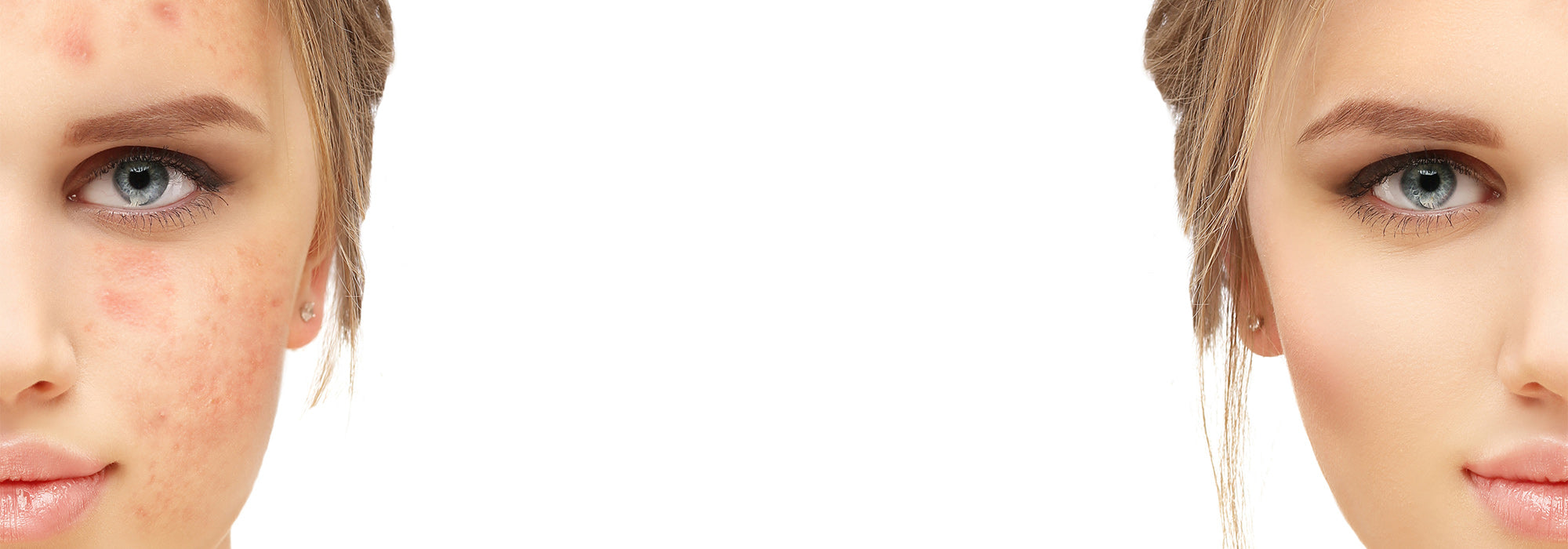Understanding Acne: The Different Types
Comedonal Acne
Comedonal acne is characterised by clogged pores that lead to acne blemishes such as blackheads and whiteheads. This type of acne is typically caused by excess oil, dead skin cells and debris blocking the hair follicles. It’s often seen in individuals with oily skin and can be managed with proper cleansing and exfoliation.
Treatment Tips:
- Use gentle exfoliants to remove dead skin cells and prevent clogged pores.
- Incorporate salicylic acid, glycolic acid and topical retinoids to help clear acne lesions and prevent new ones from forming.
Inflammatory Acne
Inflammatory acne occurs when clogged pores become infected, leading to inflammatory acne lesions that are red, swollen and often painful. This type of acne can vary from moderate acne to more severe forms and is commonly associated with acne vulgaris.
Treatment Tips:
- Look for products containing Niacinamide to reduce bacteria and inflammation.
- Regular use of salicylic acid, glycolic acid and retinoids can help unclog pores and treat inflammatory acne lesions.

Cystic Acne
Cystic acne is one of the most severe forms of acne, characterised by large, painful nodules and cysts deep within the skin. This type of acne can lead to significant acne scarring if not treated promptly. Cystic acne is often caused by hormonal fluctuations, making it a common form of hormonal acne.
Treatment Tips:
- Seek medical advice
- Treating acne at this level often requires script medicines and acne therapies.
- Avoid squeezing or picking at nodules and cysts to prevent acne scarring.
Nodular Acne
Similar to cystic acne, nodular acne involves hard lumps under the skin, known as nodules. These acne lesions can be painful and are difficult to treat with over-the-counter products. Nodular acne often requires a more aggressive treatment approach to prevent severe acne and acne scars.
Treatment Tips:
- Consult with a skin doctor or dermatologist for prescription-strength treatments.
- Regular cleansing and use of topical retinoids can help manage the condition.
Hormonal Acne
Hormonal acne is linked to fluctuations in hormone levels, often appearing around the jawline and chin. This type of acne can range from mild acne to severe forms and is characterised by persistent acne lesions that flare up during hormonal changes.
Treatment Tips:
- Balance your hormones through lifestyle changes and possibly medication.
- Use targeted acne treatment products to manage flare-ups and reduce acne blemishes.

General Tips for Managing Acne
To manage acne effectively, it's crucial to follow a consistent skincare routine that addresses your specific acne type. Regular cleansing, exfoliation and the use of appropriate acne treatment products can help prevent the development of new acne lesions and reduce the risk of acne scarring.How to Use Allmedic Products to Treat Different Types of Acne
When it comes to treating acne, a tailored skincare routine can make all the difference. Whether you're dealing with comedonal, inflammatory, cystic, nodular, or hormonal acne, the following Allmedic products are designed to work together to help manage and treat these skin concerns effectively.
Cleanse: Allmedic Acne Clear Cleanser or allmedic Active Face & Body Cleanser
Suitable for: All types of acne This gentle cleanser is crucial for clearing clogged pores, removing excess oil and preventing the formation of blackheads, whiteheads and inflammatory acne lesions. Use it morning and night to maintain a clean, fresh complexion.Exfoliate: Allmedic Acne Clear Scrub & Allmedic Active Exfoliating Scrub
Suitable for: Comedonal, Inflammatory and Nodular Acne Regular exfoliation with these scrubs helps to remove dead skin cells that can block pores and cause comedonal acne. They also promote skin renewal, which is beneficial for reducing inflammation in cases of inflammatory and nodular acne. Use 2-3 times a week for best results.Treat: Allmedic Acne Clear Night Exfoliating Lotion or Skin Repair lotion
Suitable for: Cystic, Hormonal and Nodular Acne This powerful night lotion targets deep acne lesions, such as cysts and nodules, by exfoliating and renewing the skin overnight. It’s particularly effective for managing hormonal acne, which often requires stronger, targeted treatments.Soothe: Allmedic Detoxifying Skin Lotion
Suitable for: Inflammatory, Cystic and Hormonal Acne Acne often leads to redness and inflammation. This detoxifying lotion calms the skin and reduces inflammation, making it ideal for soothing inflammatory and cystic acne. It's also beneficial for hormonal acne, which can cause widespread skin irritation.Conclusion
Understanding the different types of acne and how to treat them is key to achieving clear, healthy skin. Allmedic offers a range of products that are versatile and effective in treating acne across the spectrum, from mild to severe forms. Consistency in your skincare routine, combined with the right products, can help prevent acne scars and keep your skin looking its best.FAQs
How does a clogged hair follicle contribute to developing acne?
A clogged hair follicle can trap oil, bacteria and dead skin cells, leading to the formation of an acne lesion. This process can result in various types of acne, from mild to more severe forms.Can dry skin lead to acne?
Yes, dry skin can cause your sebaceous glands to produce more oil, which may clog pores and contribute to developing acne. It's important to hydrate the skin properly while using products designed to treat acne.What should I do if my acne becomes a severe form?
If your acne progresses to a severe form, such as cystic acne, it's crucial to consult a dermatologist or skin doctor for professional advice. They may recommend stronger treatments or combination therapies to effectively treat acne.
This information is not intended to be used for diagnosis or treatment. It is aimed at presenting a perspective only and is not a substitute for a prescription. Anyone experiencing a medical condition should consult their doctor.


